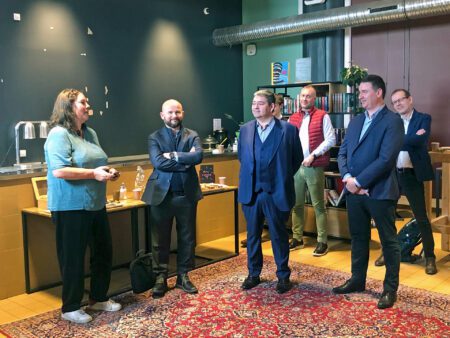Representatives from the European Parliament, the European Committee of the Regions, and progressive organisations travelled to Paris, France, today to examine an innovative project helping people who have been without work for a year or longer.
Long term unemployment – which affects over five million people in the EU – is the focus of the visit by members of the Social Europe Network (SEN) of the Party of European Socialists (PES).
The French Territoires zero chômeur de longue durée (TZCLD) – Zero long term unemployed zones – provide employment opportunities tailored to the competences and aspirations of the long-term unemployed. It creates socially valuable jobs where the market will not, utilising reallocating the public resources usually spent on unemployment costs.
Agnes Jongerius MEP, Chair of PES Social European Network, said:
“Long term unemployment is not inevitable. People want to work, and there is work to be done. But the labour market fails to match both.
“We have been following the development of zero long term unemployment zones for a while already, in France, Belgium, in Austria and in The Netherlands. The models all have their nuances, but they all show that no one is unemployable.
“Such initiatives have real potential. Zero long term unemployment zones are a way to bring back people to work, in quality employment, based on their skills, for the benefits of the community.”
XIII Avenir, one of the Territoires zero chômeur de longue durée projects located in the 13th arrondissement of Paris, provides services – such as small repairs, carpentry, a helping hand for older citizens, local deliveries and more – for those who live and work in the area. Where social and environmental needs go unmet, it creates useful jobs.
Employment deprivation costs more than creating additional jobs. TZCLDs reach out to the long-term unemployed and identifies, with them, the activities they would like to develop. TZCLDs then hire people indefinitely to run these activities, through government funds, paying them at least the minimum wage. It is a voluntary choice for the worker and is not imposed on them, as some ‘back to work’ schemes do which show poor results in the long term.
Today’s visit to the project provided PES members and partners with an opportunity to exchange with Zero Long term unemployed zones’ stakeholders and employees and discover the activities developed as part of the initiative.
The policy was put in place in Paris and other local areas across France after the French parliament unanimously passed a motion in 2016 to trial the project in ten localities. Similar schemes have since been rolled-out in Brussels, Wallonia, Groningen (NE) and Marienthal (AT).
European socialists and democrats continue to push to put employment on the European agenda. EU-led policies to boost employment have already taken place through the Youth Guarantee, which saw EUR 9 billion invested to support citizens under 30 years old enter or remain in employment. The PES remains focused on what further measures can be put in place through the EU to support employment and strengthen local communities.
PES Deputy Secretary General, Deputy Mayor of Berchem-Sainte-Agathe (Brussels) and member of the PES Group in the European Committee of the Regions, Yonnec Polet, presented an own-initiative opinion – Zero long-term unemployment: the local and regional perspective – to European Committee of the Regions last week.



